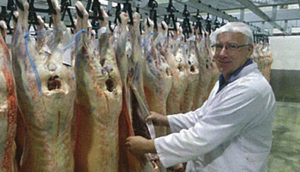Read the latest information on
Foot-and-mouth disease
 A first-hand experience with ovine Johne’s disease (OJD) seven years ago put wool producers, Shelley and Chris Cocker from Evendale in Tasmania on a crusade to help make other Tasmanian producers more aware of the disease and the biosecurity practices required to minimise the incidence of OJD.
A first-hand experience with ovine Johne’s disease (OJD) seven years ago put wool producers, Shelley and Chris Cocker from Evendale in Tasmania on a crusade to help make other Tasmanian producers more aware of the disease and the biosecurity practices required to minimise the incidence of OJD.
Thanks to their tireless efforts, the Cockers were chosen as one of three finalists in the 2013 Biosecurity Farmer of the Year Award.
Shelley and Chris were nominated for their biosecurity work on two fronts.
The first is their implementation of biosecurity practices on their own merino farm ‘Barega’, and the second through Chris’ role as the Quality Assurance Manager at the Tasmanian Quality Meats (TQM) Abattoir in Cressy, Tasmania.
Duncan Rowland, AHA Executive Director of Biosecurity Services, highlighted that Chris and Shelley’s experience when their own flock was affected by OJD was the catalyst for their campaign against the disease.
“After discovering OJD in their flock in 2007, Shelley and Chris began a vaccination program, stock inspections, used sheep health statements when trading animals, and implemented Australian Breeding Values.”
“The Cockers are now confident that the disease is under control,” said Mr Rowland.
Mr Rowland said Chris’ approach to his role as TQM Abattoir’s Quality Assurance Manager was a key factor in the Cockers’ nomination as finalists.
“Chris ensures that the abattoir meat inspectors follow correct procedures and record any health conditions, including signs of OJD, in slaughtered stock.
“Chris personally contacts any producer whose line of sheep has been detected with signs of illness or disease and provides information about the condition to the producer and encourages them to contact their vet.”
“Chris also participates in the producer training program being developed and run by the abattoir since 2011, which has been integral in OJD management and vaccination workshops around Tasmania and has assisted with OJD research at Charles Sturt University,” Mr Rowland said.
Chris and Shelly’s application included a message to their fellow producers. “Use available resources like abattoir monitoring. If you don’t know if you have OJD on your property, send in a sample to your local abattoir for a diagnosis, and always ask for a completed Sheep Health Statement when purchasing or agisting sheep.”